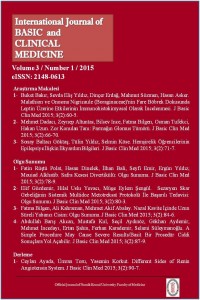Year 2015,
Volume: 3 Issue: 2, 71 - 77, 02.05.2016
Abstract
Amaç: Epilepsi,çocukluk ve ergenlik çağında en sık görülen nörolojik bir hastalıktır. Erkek ve kadınlarda eşit sıklıkta görülen bu hastalık her yaş grubunda görülmekle birlikte en fazla
genç ve yaşlı grupta görülür. Epileptik nöbetlerde doğru yapılan ilk yardım uygulamaları hayat kurtarıcı olmakta birlikte oluşabilecek yaralanmaları engellemektedir. Araştırma,
üniversite öğrencilerinin epilepsideki ilk yardım uygulamalarını incelemek amacı ile tanımlayıcı olarak yapıldı.
Anahtar kelimeler: Epilepsi, ilkyardım, üniversite öğrencisi, hemşirelik
Keywords
References
- Fisher RS, van Emde Boas W, Blume W, Elger C, Genton P, Lee P, Engel J Jr. Epileptic seizures and epilepsy: definitions proposed by the International League Against Epilepsy (ILAE) and the International Bureau for Epilepsy (IBE). Epilepsia. 2005;46(4):470- 2.
- de Boer HM, Mula M, Sander JW. The global burden and stigma of epilepsy. Epilepsy Behav. 2008;12(4):540-6.
- Mbuba CK, Ngugi AK, Newton CR, Carter JA. The epilepsy treatment gap in developing countries: a systematic review of the magnitude, causes, and intervention strategies. Epilepsia. 2008;49(9):1491- 503.
- Lee MM, Lee TM, Ng PK, Hung AT, Au AM, Wong VC. Psychosocial Well-Being of Carers of People with Epilepsy in Hong Kong. Epilepsy Behav. 2002;3(2):147-57.
- Njamnshi AK, Angwafor SA, Baumann F, Angwafo FF, 3rd, Jallon P, Muna WF. Knowledge, attitudes, and practice of Cameroonian medical students and graduating physicians with respect to epilepsy. Epilepsia. 2009;50(5):1296-9.
- Njamnshi AK, Tabah EN, Bissek AC, Yepnjio FN, Angwafor SA, Dema F, Fonsah JY et al. Knowledge, attitudes and practices with respect to epilepsy among student nurses and laboratory assistants in the South West Region of Cameroon. Epilepsy Behav. 2010;17(3):381-8.
- Fonseca LC, Tedrus GM, Costa AC, Luciano PQ, Costa KC. Knowledge and attitude toward epilepsy among health area students. Arq Neuropsiquiatr. 2004;62(4):1068-73.
- Mason C, Fenton GW, Jamieson M. Teaching medical students about epilepsy. Epilepsia. 1990;31(1):95-100.
- Tedrus GM, Fonseca LC, Vieira AL. Knowledge and attitudes toward epilepsy amongst students in the health area: intervention aimed at enlightenment. Arq Neuropsiquiatr. 2007;65(4B):1181-5.
- Zielinska A, Klos E, Talarska D. Youth's knowledge and attitude to epilepsy. Rocz Akad Med Bialymst. 2005;50 Suppl 1:99-101.
- Dilorio C, Faherty B, Manteuffel B. Learning needs of persons with epilepsy: a comparison of perceptions of persons with epilepsy, nurses and physicians. J Neurosci Nurs. 1993;25(1):22-9.
- Long L, Montouris G. Knowledge of women's issues and epilepsy (KOWIE-II): a survey of health care professionals. Epilepsy Behav. 2005;6(1):90-3.
- Fernandes PT, Noronha AL, Sander JW, Bell GS, Li LM. Training the trainers and disseminating information: a strategy to educate health professionals on epilepsy. Arq Neuropsiquiatr. 2007;65:14-22.
Year 2015,
Volume: 3 Issue: 2, 71 - 77, 02.05.2016
Abstract
References
- Fisher RS, van Emde Boas W, Blume W, Elger C, Genton P, Lee P, Engel J Jr. Epileptic seizures and epilepsy: definitions proposed by the International League Against Epilepsy (ILAE) and the International Bureau for Epilepsy (IBE). Epilepsia. 2005;46(4):470- 2.
- de Boer HM, Mula M, Sander JW. The global burden and stigma of epilepsy. Epilepsy Behav. 2008;12(4):540-6.
- Mbuba CK, Ngugi AK, Newton CR, Carter JA. The epilepsy treatment gap in developing countries: a systematic review of the magnitude, causes, and intervention strategies. Epilepsia. 2008;49(9):1491- 503.
- Lee MM, Lee TM, Ng PK, Hung AT, Au AM, Wong VC. Psychosocial Well-Being of Carers of People with Epilepsy in Hong Kong. Epilepsy Behav. 2002;3(2):147-57.
- Njamnshi AK, Angwafor SA, Baumann F, Angwafo FF, 3rd, Jallon P, Muna WF. Knowledge, attitudes, and practice of Cameroonian medical students and graduating physicians with respect to epilepsy. Epilepsia. 2009;50(5):1296-9.
- Njamnshi AK, Tabah EN, Bissek AC, Yepnjio FN, Angwafor SA, Dema F, Fonsah JY et al. Knowledge, attitudes and practices with respect to epilepsy among student nurses and laboratory assistants in the South West Region of Cameroon. Epilepsy Behav. 2010;17(3):381-8.
- Fonseca LC, Tedrus GM, Costa AC, Luciano PQ, Costa KC. Knowledge and attitude toward epilepsy among health area students. Arq Neuropsiquiatr. 2004;62(4):1068-73.
- Mason C, Fenton GW, Jamieson M. Teaching medical students about epilepsy. Epilepsia. 1990;31(1):95-100.
- Tedrus GM, Fonseca LC, Vieira AL. Knowledge and attitudes toward epilepsy amongst students in the health area: intervention aimed at enlightenment. Arq Neuropsiquiatr. 2007;65(4B):1181-5.
- Zielinska A, Klos E, Talarska D. Youth's knowledge and attitude to epilepsy. Rocz Akad Med Bialymst. 2005;50 Suppl 1:99-101.
- Dilorio C, Faherty B, Manteuffel B. Learning needs of persons with epilepsy: a comparison of perceptions of persons with epilepsy, nurses and physicians. J Neurosci Nurs. 1993;25(1):22-9.
- Long L, Montouris G. Knowledge of women's issues and epilepsy (KOWIE-II): a survey of health care professionals. Epilepsy Behav. 2005;6(1):90-3.
- Fernandes PT, Noronha AL, Sander JW, Bell GS, Li LM. Training the trainers and disseminating information: a strategy to educate health professionals on epilepsy. Arq Neuropsiquiatr. 2007;65:14-22.
There are 13 citations in total.
Details
| Primary Language | Turkish |
|---|---|
| Journal Section | Araştırma Makaleleri |
| Authors | |
| Publication Date | May 2, 2016 |
| Published in Issue | Year 2015 Volume: 3 Issue: 2 |


